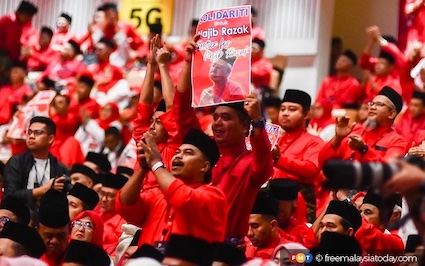All signs point to a seismic shift in Malaysian politics

Increasing Malay support for the PAS-led PN, and the unconvincing performance of the unity government thus far, are likely to fuel the change.
(FMT) – Support for Umno has been bleeding since the party’s very successful outing at the 2004 general election under Abdullah Ahmad Badawi. Umno led Barisan Nasional to one of its finest victories, obtaining 35% of all votes cast.
The following two general elections under Najib Razak showed an erosion of support especially from its solid Malay base, when BN’s vote share dropped to 30%, then to only 20% in 2018.
Last year, BN managed to secure only 16%, with only 30 seats to show for their efforts. Obviously, Malay voters deserted their once preferred party, initially to PKR and PAS, then in droves to the newly formed all-Malay coalition of Perikatan Nasional, comprising PAS and Bersatu.
Last month, it got worse. Malay voters at the six state elections pulverised Umno leaving it with only 19 of the 108 seats it contested. PKR also lost much ground, its Malay support moving to PN.
This drift of bleeding Malay votes was also seen at the Pulai parliamentary and Simpang Jeram state by-elections on Sept 9 although Pakatan Harapan (PH) managed to retain the seats.
To many, this swing is unlikely to be reversed as the use of race and religion is proving to be extremely effective. Malay voters especially from the rural and suburban areas have bought PN’s indoctrination that DAP is anti-Malay and against Islam hook, line and sinker.
The Anwar Ibrahim-led unity government appears to be unconvincing in its rebuttals and have seemingly lost the social media battle in this aspect. The opposition’s argument is that he is holding the top post courtesy of the non-Malay voters and that it is not right according to Islam.
Most of the PAS and Bersatu supporters and the neutrals who prefer PN seem to think that Malaysia will march on as it is, whoever is at the helm. All they want is religious, cultural and racial superiority in the nation’s way of life.
With this trend, an inevitable change in Malaysia could happen in a few years based on the current trajectory. Whether it’s for better or for worse, it all depends on who you talk to.
Long-held beliefs are being challenged, and in some cases replaced. No one can argue that a fundamental change has been under way in Malaysian politics – and perhaps the Malaysian way of life.
Basic rights regarding what you can wear, do or enjoy in public have all been coming under scrutiny. Surprisingly, the unity government has started showing its conservative side by cancelling concerts with little Napoleons issuing dress and gender guidelines.
Here, Anwar may have unwittingly led to more Malays voting for PN as they may be thinking that Islam will benefit more in the process.
The pace of change here seems to be gathering strength, especially since the fall of the PH government in 2020. The “green wave” seen at the recent state elections is a testament to what could possibly turn into an unstoppable tide.
If you roll back the clock just four years ago, few of us would have believed that a PAS-led coalition would be the choice of most Malays and could be serious contenders to lead a coalition bidding for federal power at the general election due in four years.
PAS and Bersatu know how to successfully prick the Malaysian psyche effectively. The leaders know that some of their Islamic pronouncements are taken as gospel truth. When it comes to religion, most Malaysians would rather err on the side of caution and that becomes a problem.
They tend to buy the stories from the preachers without question. Their thought processes come to a standstill, thus refusing to analyse arguments before making decisions.
Progressive Malaysians cannot ignore what is happening or pretend it will go away. If we do not respond politically, we may end up being co-opted into accepting these changes as necessary and good.
However, with no significant and tangible action or achievement from the current government and its leaders that can inspire Malaysians, the PH-Barisan Nasional combination is perceived as not being able to hold back the green tidal wave that might engulf them at the next general election.
This is made worse by an ailing Umno with some of its leaders attacking from the inside and those sacked firing away from the outside. All this will just lead to more loss of Malay votes.
Many now doubt if Anwar and his Cabinet can avoid the potential political tsunami that is building. It looks tough and that could be the reality.

